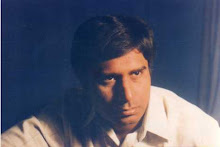This is the mind set of a woman who is about to leave the house and also the town where she came as virgin and became a woman and then a mother.
The day was full of reflections and recollections. We were about to leave next morning. This was my last day in Baitwara. Change creates dreams and constancy ruptures them. My marriage was like a change like the Independence of India that brought about many dreams and now the constancy. We loose, yet it reminds us of the same train again and again. It mills our dreams into tiny particles of reality. It dries out the petals of dreams and makes them thorns that drill invisible holes in our dreaming self but nothing oozes out. I was getting ready for a new change but a change without dreams. How difficult it is to change our name after having written it many times before.
'Change the name,' Lohiya made a vociferous appeal. 'No Lady Victoria. No Lady Elgin.' He shouted like a mad hound. We forget our name but enjoy the ecstasy of a forgotten name. Now nobody calls me Mohan. I became Mohini Devi when I got married: Bhabhiji when I came to the City of Rocks and now everybody calls me Amma. I have forgotten my first name. After my brother's death no one ever called me that but I can't spell it a new. Can I? 'You will be a princess of Baitwara,' my father declared after my engagement.
'Baitwara Ki Bahu,' my Bhabhi teased me. But where was my kingdom? Your grandfather, like Buddha was eager to renounce the state and I like Sita was making my mind for exile, an irrevocable exile. Baitwara made me a wife, a woman and mother. Could I erase this name like incorrect reading in a lab. I think I can’t. A name penned down in washable ink leaves the clear print of pains on the heart of the paper. Then, how could I erase the first inscription on the blank sheet of my soul? That was the first thing that made me shy in lonely hours. That was the first name that made me stranger to my own image in the mirror or in the penancing water of the sage like pond. I knew Baitwara much before I learnt your grandfather's name. It was a Dai who first acquainted me with his name
'You are much elder to the boy,' she confided with uncharacteristic serenity.
'What?' I exclaimed.
'Yes,' she giggled, ‘you are Mohan and he is also Mohan. But he is a calf Mohan, a just born, and you ... you are a grown up Mohan.' She played about with our names, much before I came to know your grandfather’s name. And I had to erase the name that gave me a name. Could I apply the sharp edge of the shaving blade on the sheet of my soul? Could I throw acid on it and wash it to emaculate blank? It was not easy to do it without leaving the marks of woe. I could never do it. A woman could never do it.
Friday, December 17, 2010
Subscribe to:
Posts (Atom)



